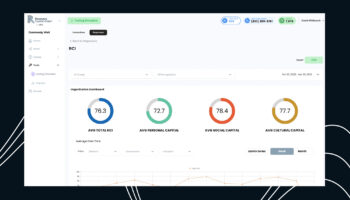Insights & Resources
Filtered by: Recovery Intelligence
Role of loss aversion in addiction recovery
Loss aversion is a strong behavioral and psychological bias that needs more attention and application in addiction careThe reason we need to incorporate more psychology and behavioral science into our care models is simple …The time to recover from addiction is unnecessarily long and difficult.
Read More →By David
11/30/22
On the origins of recovery capital
Despite popular depictions and tropes of people struggling with addiction, most people overcome alcohol and drug dependencies without the aid of formal treatment.How is this possible?How does someone suffering a “disease” get well without clinical care?That was the question Robert Granfield and William Cloud explored and set out to answer in the late 90s. This understanding could focus social, political, and clinical solutions across the spectrum of addiction and dependency experiences.Recovery capital was the term they coined to encapsulate the physical, social, and human resources that individuals draw upon to naturally recover.
Read More →By David
10/21/22
On celebrating good decisions
When you are heads down working toward a goal, have you ever gotten a small win or made a change in life and never thought twice of it? You just took it for granted and continued one.This happens all the time and to all of us. But this is actually a bad habit.
Read More →By David
10/9/22
Measuring beyond sobriety
A person you love seems to care about nothing of importance in their life. They disappear for days, weeks, maybe even months or years. At first, this person’s relationship to alcohol or drugs was no different than anyone else’s. But slowly then all at once, chaos. Addiction takes hold. It’s a vortex. Everyone gets sucked in.
Read More →By David
10/4/22
Unveiling our new Recovery Capital Index Reporting Tool
With the new RCI aggregate reporting tool, you can immediately see the collective recovery capital for your organization. Filter, focus, and export the data as you need to directly inform recovery and care plans.
Read More →By David
4/20/22
Don’t pick the outcome, pick the outcomes framework
When an organization picks a specific outcome, it will do whatever it needs to get that outcome.In the world according to Simon Sinek, this is a finite mindset. A finite mindset can ruin a business. In healthcare — and especially addiction care — it can destroy lives.Addiction treatment would be better if it adopted an infinite mindset.
Read More →By David
3/31/22
Everything is figureoutable
It has been a little while since I last wrote in this space. The reason is not for a lack of things to write about. The reason is that I have been sorting out the work of Commonly Well and the direction of the Recovery Capital Index. Starting a business and getting it out there is tough, even for seasoned veterans. Doing so in the middle of a global pandemic is doubling challenging. But, we are figuring it out.
Read More →By David
9/24/21
On understanding the problem
We are not well. By any measure, our society in the U.S. is broken. This is a hard truth, but it is the truth. Economically, we’re stagnant. Specifically, wage growth. There is none. Socially, we’re retreating. Specially, we’ve fallen nine spots on the Social Progress Index over the last 10 years. As an optimist, I am not paralyzed by this truth. Instead, it’s fuel for seeking a path forward.
Read More →By David
4/4/21
You and your friends affect the recovery capital of others
ISSUE #3 — The IndexHow often do you consider the affect on others when you change your normal behavior or behavior that comports to a social norm?I am almost always thinking about and observing human behavior. Although, there are times I get distracted and do things that disrupt positive behavioral flow. It's quite annoying when I realize it later – but imagine what it's like for those disrupted?How we take care of ourselves and the routines we follow, have considerable affect on those around us.
Read More →By David
3/25/21
Recovery Capital is the third leg of the addiction solution stool
ISSUE #1 — The IndexIn a commentary written by Josh Nussbaum, CEO and co-Founder of Halcyon Health, he identified measurement as the third leg of the solutions stool for addiction in the U.S. Nussbaum wrote that we must measure “disease progression, treatment efficacy, and long-term outcomes.” Such a measurement has the potential for upstream disruption. Yes, we need to improve the quality of care and advance the types of care for the millions getting care, but millions more are destined to experience the hell of addiction if we don't have a connected upstream or prevention strategy.
Read More →By David
3/11/21
On transportation and addiction recovery
As a reader of this newsletter, you now know that addiction is a lens through which I will view inequities, barriers, and poor design. With limited exceptions, addiction is a condition that manifests over time and through repetition. Reversing the effects of addiction are incredibly difficult because our environment isn’t optimized for health or to make life easy — unless of course you have the things needed to navigate the environment (in which, life is never really easier, just easier).
Read More →By David
3/7/21
Identifying a set of operating principles
Form follows function. This is a hard and fast rule, right?I suppose it depends on whom you ask. Put an architect, product designer, industrial engineer, and a software developer in a room together and my guess is the discussion, err debate, could go on a long time.
Read More →By David
3/1/21











